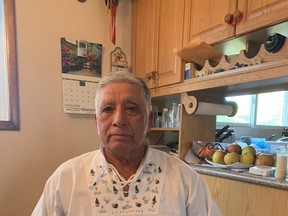
Article content
A Kingston-area man is raising alarms about the ongoing human rights abuses being inflicted by the El Salvadoran government on its citizens.
Advertisement 2
Article content
Ignacio Melgar, an El Salvadoran immigrant who has been in Kingston for the past 30 years, is gravely concerned about the more than 50,000 arrests that have taken place in the country under the guise of a state of emergency and the subversion of democratic norms by the government.
Since his election in 2019, the current president of El Salvador, Nayib Bukele, has garnered quite a bit of controversy, most recently with his declaration of a state of emergency to address the issue of gang violence in March 2022.
According to Human Rights Watch, since the declaration of the state of emergency, there has been growing evidence of serious human rights violations, including arbitrary arrests, short-term disappearances and multiple deaths of people in custody.
Advertisement 3
Article content
People living in poor communities have been disproportionately impacted by these arrests.
“Human Rights Watch has documented many arrests apparently based solely or largely on people’s age, their appearance or their residence in a gang-dominated rural or urban neighborhood, factors that have nothing to do with whether they have committed a crime,” Human Rights Watch said.
Melgar explained that while the state of emergency in theory applies to everyone, crime organizations such as the infamous MS-13 have the money and lawyers to avoid serious consequences.
“If the policemen see that you have a sun tattoo or you are dressed like a gang member, they can arrest you and you will go to jail,” Melgar explained in an interview with the Whig-Standard. “These organizations, they have a lot of money and they have a lawyer. If a higher-up goes to jail, they call the lawyer and they find a loophole. But the common people, they don’t have money, they don’t have jobs, they are still in jail.”
Advertisement 4
Article content
The issue of gang-related violence is one of the key issues that got Bukele elected in the first placed and is a serious problem in the country. But Melgar explains that many of the people who get involved with organized crime do so because they have no alternatives — especially people who have been deported back from the United States.
Facing high levels of poverty and few employment opportunities, many people in El Salvador will pay to be smuggled into the United States.
“People will come and say, ‘I can bring you to the United States for a certain amount (of money),’ and people are so desperate — they don’t have jobs many of them — so they sell what they are able to to go to the United States,” he explained.
However, for people who get deported to El Salvador, they have nothing left when they return.
Advertisement 5
Article content
“There’s no jobs, the poverty is so terrible, and the gangs approach them and say ‘join us.’ It’s desperation and a lifeline,” Melgar said.
Upon his election, Bukele committed to crackdown on gang-related violence, though it was later revealed that it was a backdoor deal made between Bukele’s government and leaders of the organized crime groups MS-13, Barrio Ravolucionarios and Barrio 18 Sureños that led to a historically low homicide rate.
“In exchange for their commitment to holding the national homicide rate at a historic low, the gangs demanded among other conditions, improved prison conditions and increased employment opportunities for their members outside of prison”, El Faro reported.
However, after deviating from the agreement, MS-13 leaders claimed responsibility for a spree of murders that resulted in 87 deaths.
Advertisement 6
Article content
It was following this event that Bukele implemented the state of emergency, which has seen the dissolution of legal protections from unlawful detainment.
For Melgar, the current situation illustrates clearly the contradiction of Bukele’s appeal — while he claims to be acting to improve the situation for the people, he is only protecting the powerful.
While poor, hard-working people are unlawfully detained, high-level, wealthy gang leaders are able to negotiate and avoid meaningful legal ramifications.
For Kingston city councillor Robert Kiley, who acted as an election monitor in the 2019 election, seeing the country fall has been upsetting.
“At the time, it was an exciting moment: a free and fair election which broke the mould from nearly 40 years of entrenched left/right divide that had cemented after the bloody civil war with victory of a young centrist who, himself a former mayor, promised reform and unity,” Kiley said in an email to the Whig-Standard. “Since that time, I understand — especially from local residents of our city, expatriates of the Latin American country in question — that there have been many abuses of power, even subversion of democracy and the constitution. This concerns and saddens me. I hope El Salvador realizes its potential as a modern, transparent democratic society which honours the rule of law and rights of all residents.”
Advertisement 7
Article content
For Melgar, who fought hard to see El Salvador become a fair and prosperous country for it’s people, seeing the state of the current government is very difficult.
“People know he is a liar and the promises he made are not coming true. He is making the rich people richer,” he said. “But we have a core group (there), resisting. We will see what happens; we have to hope.”
Melgar is hoping that the Canadian government will take note of the ongoing issues in El Salvador. He said he has reached out, with the assistance of Kiley, to Kingston and the Islands MP Mark Gerretsen and Foreign Affairs Minister Melanie Joly to discuss this issue but has yet to meet with either party.
bgoulem@postmedia.com
Source link












